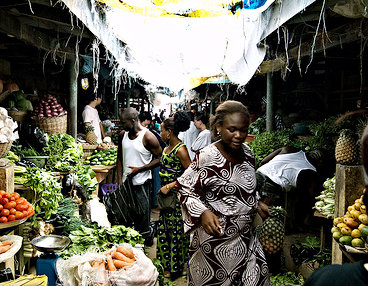Why Do The HAUSA/FULANI Have No Middle Class? - Politics - Nairaland
Nairaland Forum / Nairaland / General / Politics / Why Do The HAUSA/FULANI Have No Middle Class? (1201 Views)
Enugu Vs Fulani:hausa/fulani Have All Fled Uzo Uwani As Youths Explodes / Just Because Benue People Voted David Mark Fulani Have murder 300 Today in Agatu / Hausa-fulani Have Ruined FRCN - Acting DG, Samson Shaibu (2) (3) (4)
| Why Do The HAUSA/FULANI Have No Middle Class? by 2million1(m): 7:52pm On Oct 12, 2012 |
I was just wondering over this, this evening, unlike the Ibos and the Yoruba why do the Hausa/Fulani have no middle class? It is either they are too rich or too poor, what happened to the middle class? Please lets hear your views. |
| Re: Why Do The HAUSA/FULANI Have No Middle Class? by Sunofgod(m): 7:55pm On Oct 12, 2012 |
They have a middle class - its just that they act like they are poor. You may see a common aboki hustling cigarettes, cattle or currency and assume they have no money - but they do. I'm sure even some of their beggars are millionaires. |
| Re: Why Do The HAUSA/FULANI Have No Middle Class? by ektbear: 8:00pm On Oct 12, 2012 |
What would the middle class sustain itself on? It is hard to have a middle class without electricity, poor infrastructure, with a weak economy (weak even by Nigerian/African standards), etc. |
| Re: Why Do The HAUSA/FULANI Have No Middle Class? by Nobody: 8:02pm On Oct 12, 2012 |
Interesting poser @OP. My view is that successive Northern leaders considered it expedient not to develop one. |
| Re: Why Do The HAUSA/FULANI Have No Middle Class? by Arsenate(m): 9:45pm On Oct 12, 2012 |
Damn...you southerners are way too obsessed with the north, damnnn, lol. U hardly see a northerner discuss the south or its people. |
| Re: Why Do The HAUSA/FULANI Have No Middle Class? by HAH: 10:05pm On Oct 12, 2012 |
please can you mention the things that makes one a middle class in Nigeria |
| Re: Why Do The HAUSA/FULANI Have No Middle Class? by mike404(m): 10:26pm On Oct 12, 2012 |
Sun of god: They have a middle class - its just that they act like they are poor.    funny dude funny dude |
| Re: Why Do The HAUSA/FULANI Have No Middle Class? by nduchucks: 10:35pm On Oct 12, 2012 |
Dumb question, dumber responses. |
| Re: Why Do The HAUSA/FULANI Have No Middle Class? by Nobody: 10:38pm On Oct 12, 2012 |
2 million: I was just wondering over this, this evening, unlike the Ibos and the Yoruba why do the Hausa/Fulani have no middle class? It is either they are too rich or too poor, what happened to the middle class? Please lets hear your views. i'll tell you why there are more first bank of nigeria branches in anambra state than in kano state the highest number of bank branches in nigeria is in lagos, followed by anambra state north is dry financially |
| Re: Why Do The HAUSA/FULANI Have No Middle Class? by Callotti: 11:21pm On Oct 12, 2012 |
Can you tell the difference btw a poor Northerner and a rich Northerner? Poverty is part of their religion. . . so is HUMILITY. Unlike the arrogant loud Southerners. . . .  |
| Re: Why Do The HAUSA/FULANI Have No Middle Class? by Nobody: 11:30pm On Oct 12, 2012 |
@ op first off, define middle class in the nigerian context. then describe what a middle class person looks like! putting it mildly, close this dumb ar.z thread! 1 Like |
| Re: Why Do The HAUSA/FULANI Have No Middle Class? by Nobody: 9:24am On Oct 13, 2012 |
torkaka: @ op @OP asked a perfectly legitimate question which is not far removed from concerns notable organisations like the 'Arewa Youth Forum' have also raised in recent times. [b]“We are at the bottom of every index ranging from health, education, social amenities, and several other sectors. Worst of our woes is the insecurity ravaging the North. It is against this background that we made the following position. “That all Northern leaders who held several positions, i.e. Generals Ibrahim Babangida and Abdulsalam Abubakar, and others who have got golden opportunities of turning our region for good but did not should know and accept much of the blame. “Northerners and the world need explanation as to what led the North to the rot it is today. It was not magic but man-made as a result of deliberate manipulation of religion, self-enrichment and pervasive corruption our leaders adopted to the detriment of the larger peoples of the North. “Finally, all past and present leaders of Northern extraction should as a matter of morality and sincerity apologise to the North first. Because we got to the mess we are in due to their insensitivity, and approach to governance, which was contrary to the principles of our leader, Sir Ahmadu Bello.[/b] Source |
| Re: Why Do The HAUSA/FULANI Have No Middle Class? by Nobody: 9:38am On Oct 13, 2012 |
Whether we care to admit it or not Nigeria, like every other emerging economy, does have a buoying middle class. Source |
(1) (Reply)
HBD To Senator Ibikunle Amosun, FCA, Governor Of Ogun State. / Okorocha Likely To Be Swept Out Of Office On 31st October / Obasanjo/iyabo Feud: Why Wewon’t Intervene— Yoruba Elders
(Go Up)
| Sections: politics (1) business autos (1) jobs (1) career education (1) romance computers phones travel sports fashion health religion celebs tv-movies music-radio literature webmasters programming techmarket Links: (1) (2) (3) (4) (5) (6) (7) (8) (9) (10) Nairaland - Copyright © 2005 - 2024 Oluwaseun Osewa. All rights reserved. See How To Advertise. 27 |
